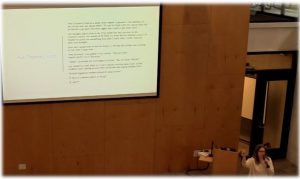(1) participates actively and constructively in Program Development Day activities
(2) presents during Program Development Days and conferences
(3) takes advantage of professional development provided by the school
(4) identifies and pursues professional development opportunities appropriate to enhancing effectiveness as an educator
In the fall of 2010, a representative from Gallup, Inc., visited EPS for a half-day workshop on their program called StrengthsFinder. The program centered around identifying one’s unique strengths and then “leveraging” them to understand how we interact with the world around us. As a participant in the workshop, I was granted access to my 34 (of 34) strengths (nothing is considered a weakness in the program). The results were intriguing and accurate as far as what I already knew about myself, and gave me language to better understand my relationships with colleagues, friends, and family members.
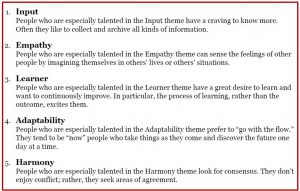 “Learner” is one of my top five StrengthsFinder strengths. As the description to the left accurately states, I like to learn and continuously improve myself. Therefore, opportunities to grow professionally are very important to me, and I always believe that I can take new ideas and apply them to better my teaching practices. I actively keep an eye out for potential conferences or workshops that could help me teach writing or reading, that I could apply to my role as an advisor, that I could access to improve the New Parent Series content.
“Learner” is one of my top five StrengthsFinder strengths. As the description to the left accurately states, I like to learn and continuously improve myself. Therefore, opportunities to grow professionally are very important to me, and I always believe that I can take new ideas and apply them to better my teaching practices. I actively keep an eye out for potential conferences or workshops that could help me teach writing or reading, that I could apply to my role as an advisor, that I could access to improve the New Parent Series content.
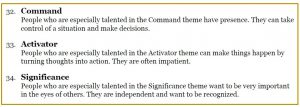 The flip side of the StrengthsFinder list – my “bottom three,” as it were (see right) – provides another insight into how challenging it is for me to share what I learn with others. I don’t naturally seek the spotlight, or take charge because I know my ideas are best. These so-called “strengths” are ones that I have had to work through, against, around, etc., in order to share what I learn with others. Throughout my years at EPS, I have had many opportunities to share what I know; each time, the biggest impediment to presenting is believing that I can provide what others cannot and that I deserve to be recognized for it.
The flip side of the StrengthsFinder list – my “bottom three,” as it were (see right) – provides another insight into how challenging it is for me to share what I learn with others. I don’t naturally seek the spotlight, or take charge because I know my ideas are best. These so-called “strengths” are ones that I have had to work through, against, around, etc., in order to share what I learn with others. Throughout my years at EPS, I have had many opportunities to share what I know; each time, the biggest impediment to presenting is believing that I can provide what others cannot and that I deserve to be recognized for it.
My learning process looks a bit like this: I tend to start learning for myself; once I’ve crystalized an idea, I begin to share it with colleagues, and then with the school community. I recently expanded beyond our school walls to present ideas to the greater independent school community, too, once I had solidified the idea through the initial steps. What I’ve learned about myself is that the more I do it (share), the more I do it!
(1) participates actively and constructively in Program Development Day activities
During Program Development Days (PDDs) on campus, I participate in a variety of ways. As Grade Level Coordinator, I lead all of the 6th-grade meetings. As the discipline representative for English from 2018-2020, I lead academic discipline meetings and worked to coordinate efforts on behalf of the other English teachers. During discussions in larger groups, I try to contribute ideas or ask questions when I have them; in smaller groups, I always feel more comfortable and ready to engage verbally.
(2) presents during Program Development Days and conferences
Presenting my work in front of others is, as I mention above, toward the bottom of my like-to-do list. With much practice, preparation, and positive encouragement, though, I have learned to use presentation opportunities to further my skills and gain confidence. On Program Development Days (PDDs) specifically, I have presented twice for Evo of Instruction and once at the NWAIS Fall Educator Conference.
Evo of Instruction (EPS)
My two solo contributions to the Evo of Instruction series came about because I was asked to present, not because I desired to do so. 🙂 Evo of Instruction is a construct developed by Jonathan Briggs years ago as a format for teachers to share classroom practices with one another in a public forum. Evos are held during PDDs and are typically themed to focus potential conversations.
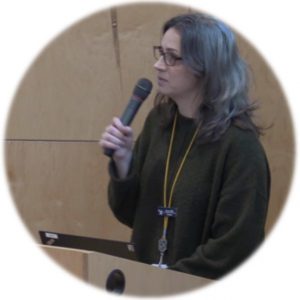 The first time I presented alone for Evo, Jake Davis, then-counselor, was actively encouraging teachers to incorporate social emotional learning into their classes, and he asked me to share a method that I use (see video). I presented about how I use the Attendance Question, which starts every one of my class periods, as a vehicle for social-emotional learning (among other things). It makes sure that each student participates verbally, that opinions and ideas can be expressed, that students listen to and engage with one another.
The first time I presented alone for Evo, Jake Davis, then-counselor, was actively encouraging teachers to incorporate social emotional learning into their classes, and he asked me to share a method that I use (see video). I presented about how I use the Attendance Question, which starts every one of my class periods, as a vehicle for social-emotional learning (among other things). It makes sure that each student participates verbally, that opinions and ideas can be expressed, that students listen to and engage with one another.
For my second Evo, the theme was connecting curriculum to the real world. Jonathan Briggs had just experienced (through his son) the annual EPS Myth project, a Literary Thinking 1 “tradition,” and he asked me to talk about how it helps connect the 6th graders to the world around them (see video). The EPS Myth incorporates elements from traditional world mythologies – studied across the unit – with our EPS world, and gives students space to imagine origin and creation stories about the EPS campus, teachers, and traditions. Presenting my work to colleagues makes me nervous every time, and at the same time builds my confidence.
Fall Educators Conference (NWAIS)
In the fall of 2017, I co-led the first iteration of the New Parent Series (NPS). The NPS is an EPS parent-education program created by Anthony Colello and myself, and is based on the premise that the partnership between teacher and parent is one of the strongest bands of support that our students can have. (read more about the creation of the NPS here) The program began as a 3-night series for parents of 5th and 6th graders new to EPS. It focused on expounding the philosophies upon which all of our curricula and programs are based: we put students at the center, we teach students to self-advocate, and we challenge students as individuals. Each night of the NPS applied these philosophies to a different critical aspect of our middle-school program: academics, technology, and culture. The intent of the NPS was to “raise the curtain,” so to speak, so that parents could see behind the scenes of our practices and, we hoped, to understand how methodically, proactively, and expertly we worked to support each of their children.
The success of the first series in the fall of 2017 was immediately obvious that school year. Teachers of 5th and 6th graders reported an exponential (albeit anecdotal) drop in the number of concerned parent emails; Middle School Head Sam Uzwack reported a noticeable drop in the number of urgent parent meetings. The overall level of anxiety (“will my child succeed?!”) lessened, and created benefits across the middle school. Teachers could focus on teaching students rather than coordinating parent meetings. Sam could observe classes, guide teachers, and create programs to enhance the middle school programs. Parents could let loose the reins to give their students more learning space. And students could be more in charge of their own learning – the ultimate benefit.
The NPS expanded the following year to include a parent-education night for 7th- and 8th-grade parents as well as one for 9th-grade families.
Bolstered by the success of that first iteration, Anthony and I vied for a presentation slot at the 2018 Fall Educators Conference sponsored by the Northwest Association of Independent Schools (NWAIS). Our application was accepted, and we shared the details and successes of the NPS with a wider swath of educators across the region.
(3) takes advantage of professional development provided by the school
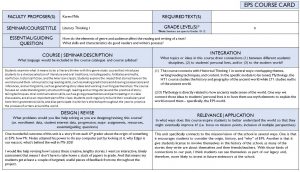 Professional development provided by the school typically happens on PDDs and is highly structured with prescribed activities such as all-faculty trainings about “hard conversations” and inclusivity, and discipline and grade-level meetings. One such structure that I took advantage of during a December 2019 PDD was “Module Tuning” with the Curriculum Committee. Module Tuning is a process by which an individual teacher presents a unit, assignment, or lesson to a group of peers and asks for feedback so that the “module” can be “tuned,” or adjusted. The process is highly structured, beginning with a review of the “EPS Course Card” (see example to the right) and focus on a specific request for feedback. I presented my EPS Myth project as my “module” and, since a focus of my teaching practice had recently been on assessment, asked for specific ideas about the following:
Professional development provided by the school typically happens on PDDs and is highly structured with prescribed activities such as all-faculty trainings about “hard conversations” and inclusivity, and discipline and grade-level meetings. One such structure that I took advantage of during a December 2019 PDD was “Module Tuning” with the Curriculum Committee. Module Tuning is a process by which an individual teacher presents a unit, assignment, or lesson to a group of peers and asks for feedback so that the “module” can be “tuned,” or adjusted. The process is highly structured, beginning with a review of the “EPS Course Card” (see example to the right) and focus on a specific request for feedback. I presented my EPS Myth project as my “module” and, since a focus of my teaching practice had recently been on assessment, asked for specific ideas about the following:
“I would like help revising how I assess these creative, lengthy stories. I want an interactive, timely assessment that means I don’t have to take home a stack of papers to grade. And that means my students get at least a couple of targeted, useful pieces of feedback from me throughout the project.”
One of the most important steps in my Module Tuning session was the brainstorming time when other particpants posed ideas, asked questions, and generated specifics about how to answer my request. I sat back and took notes while others talked, gathering poignant, topical, and innovative suggestions for the Myth. Module Tuning brought to light ideas that I hadn’t considered and WILL change the way that I assess the Myth in the future. It was an invaluable process.
In addition to the more structured and formal opportunities for professional development at EPS is one that I have not sought out, necessarily, but rather has been entrusted to me as I gain experience and retain the knowledge of our institution: mentoring new colleagues. So far, my mentoring of others has happened informally in such ways as gaining a new teaching partner (Alicia Hale, for instance) who shares a course with me and having new faculty members assigned (at least one every year!) to the advising team that I coordinate. New colleagues have the support of division heads and other colleagues, of course, but I supplement the support with on-the-ground details, planned activities, and guidance about how to maneuver through layers of tasks. I often find myself imparting knowledge about how to manage annual events like Fall Harvest, how to edit an email to a parent for tone and intent, and what steps to take when a student needs extra support. Such mentoring opportunities have built confidence in me as a teacher and leader, and have made me realize how much of an impact I can have on the culture of our school as a whole.
(4) identifies and pursues professional development opportunities appropriate to enhancing effectiveness as an educator
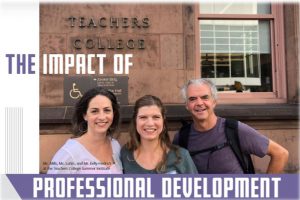 The path to my summer professional development at the Writing Institute at Columbia University’s Teachers College was several months in the making and by far the “biggest” professional development opportunity I had been granted at EPS. It started in August 2017 when Academic Dean Matt Delaney reminded all faculty members to look for opportunities outside the walls of EPS that could impact our teaching within the walls of EPS. “We’re looking to help faculty further develop their craft, aligning that with overall goals of the school program,” Delaney had said. Through a series of conversations and research that fall, I learned about the work that Teachers College was doing with writing and reading workshops; I listened to presentations from Teachers College educators and read about the impacts they had made on English classrooms around the world. I implemented small techniques in my own classes and saw significant improvements in the writing my students produced. I wanted to learn more about how these techniques might positively impact the EPS middle school writing curriculum.
The path to my summer professional development at the Writing Institute at Columbia University’s Teachers College was several months in the making and by far the “biggest” professional development opportunity I had been granted at EPS. It started in August 2017 when Academic Dean Matt Delaney reminded all faculty members to look for opportunities outside the walls of EPS that could impact our teaching within the walls of EPS. “We’re looking to help faculty further develop their craft, aligning that with overall goals of the school program,” Delaney had said. Through a series of conversations and research that fall, I learned about the work that Teachers College was doing with writing and reading workshops; I listened to presentations from Teachers College educators and read about the impacts they had made on English classrooms around the world. I implemented small techniques in my own classes and saw significant improvements in the writing my students produced. I wanted to learn more about how these techniques might positively impact the EPS middle school writing curriculum.
Among other highlights, the Institute’s website promised instruction on “teaching that fosters independence and a growth mindset in student writers,” creating writing partnerships and revising strategies for scaffolded, independent writing. So, Allison Luhrs, David Kelley-Hedrick, and I applied to the Writing Institute and at the same time submitted a request for professional development funds through EPS. As soon as Teachers College accepted us into their program, Delaney found the funds necessary to send us to New York City for the week-long institute. We set up room and board. We arranged travel. We were ready.
During my week in NYC, I had time to explore my own writing ideas, consider how to integrate writing workshop exercises into my own classroom curriculum, and to partner with Allison and David to scope out how each lesson might impact the entire EPS middle school English program. We had access to hands-on activities in small group sessions, lectures in large group sessions, and “choice” sessions each afternoon. At the end of each eight-hour day, our brains were full of writing strategies that we wanted to share with our students. After “school” each day, we also had easy access to each other, and we made full use of our time together: we brainstormed how we might incorporate our small-group lessons into our own classes, and reviewed conversations we had with middle school English teachers from all over the world about how they used the workshop model. I found that being removed from my daily routines and responsibilities, combined with the depth of immersion in a topic that I treasured, to be more inspirational to teaching writing than most other kinds of professional development I’ve experienced.
By the end of our week at Teachers College, I had gained a year’s worth of learning about writing tools, techniques, and strategies. I had also completed a short personal narrative, a piece of writing that was based off a Writing Institute activity that I wanted to share with and replicate for students in my own classroom. As I wrote my narrative, attended sessions, and worked with writing teachers from around the world, I practiced stretching my growth mindset, writing in partnerships, and scaffolding writing strategies – all the things I was so curious to learn about in the first place. I found some personal success and, most importantly, ideas for my students to embrace as they stretched themselves to become independent and thoughtful writers. (adapted from a full article in Inspire)
